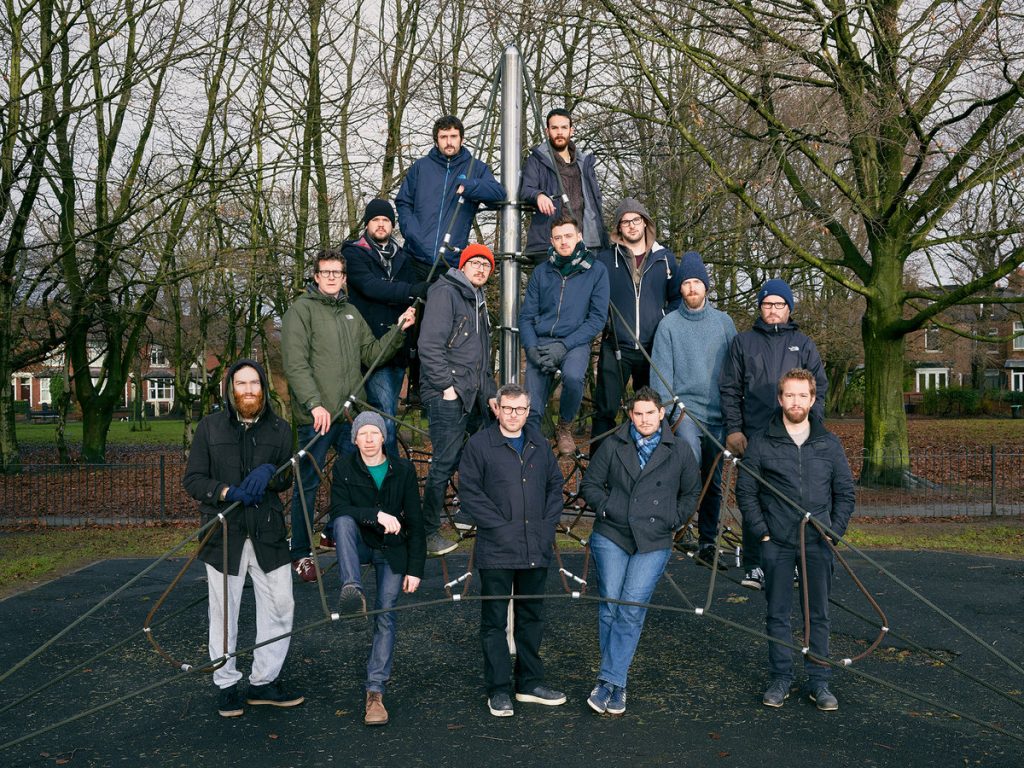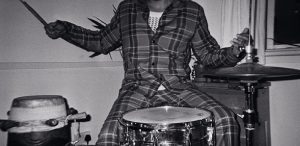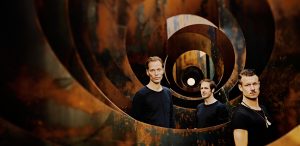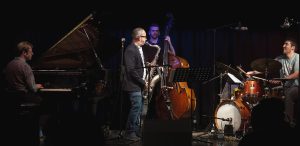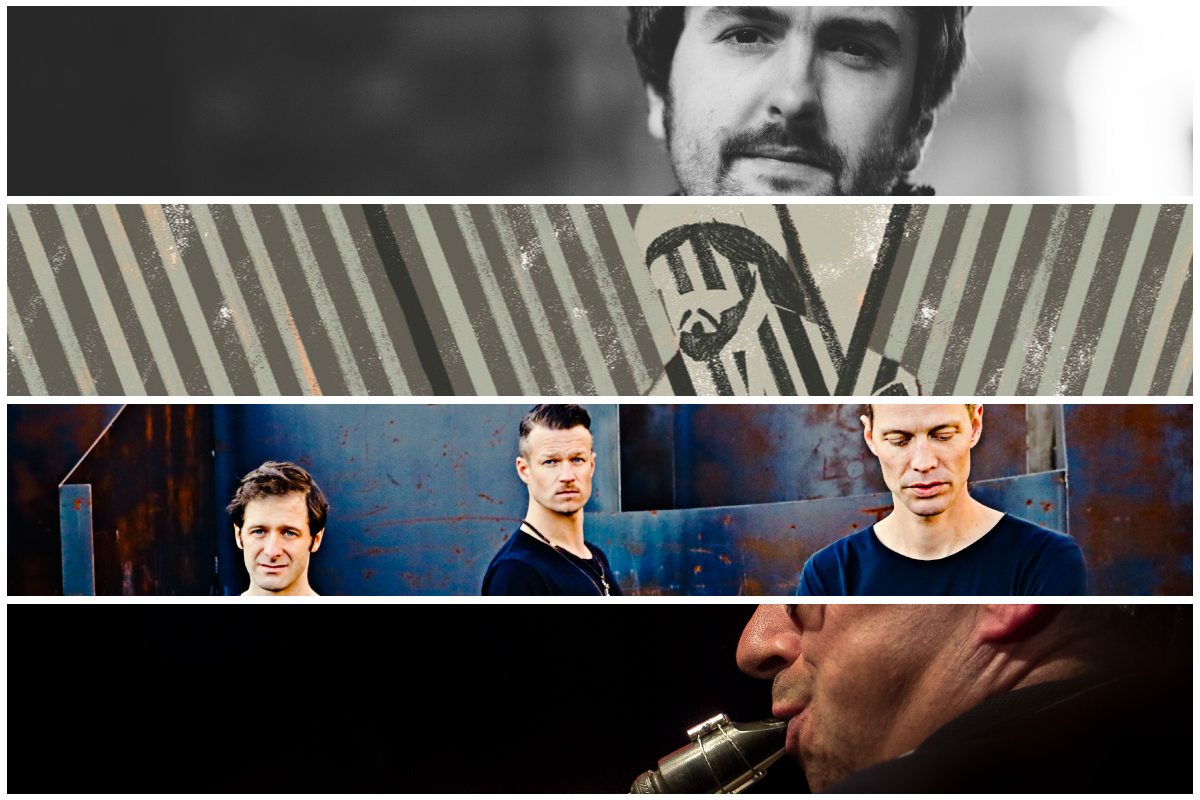
Guide to the Week of Music: Catching up with Ben Cottrell, new sounds and visuals
Welcome to the Guide to the Week of Music, a round-up of music news, media and releases from the wide musical world. This week, prior to Vijay Iyer’s fantastic trio show, we had a chat with Ben Cottrell, whose Beats & Pieces Big Band are celebrating their tenth anniversary this year. We discussed the recording of their live CD and DVD, released today on his Efpi label as well as the health of Manchester’s jazz scene. We follow that with a round-up of new music and music visuals from across the globe.
Ben Cottrell reflects on ten years of big ideas
On 27th January 2008, composer and bandleader Ben Cottrell — then a music student at the RNCM — asked thirteen friends and fellow students to join him in a college rehearsal room. He’d written some tunes for large ensemble and was eager to test them out. From this most casual of sessions emerged the mighty Beats & Pieces Big Band. They made an appearance at the Manchester Jazz Festival that same year and by the end of 2011, had been awarded the Burghausen European Young Artists’ award and recorded a live EP at Band on the Wall.
From the outset, they were anything but the traditional big band. Cottrell’s compositions veered away from the sound synonymous with the Swing Era — even that which Stan Kenton termed ‘progressive’ — in search of something daring, dynamic, cinematic and wholly contemporary.
In January of this year, their tenth anniversary beckoned. So on 27th January 2018, ten years to the day since their inaugural practice, they reconvened in that same RNCM rehearsal room (now the revamped Studio One) to record a celebratory live project. With them they brought: their close friends and family, a crew of audio-visual personnel, five new compositions and five tracks developed from the versions heard on previous studio albums.
‘We recorded Ten at the end of a week of gigs,’ Cottrell explains, as the neon glow of the Band on the Wall sign illuminates the strawberry detailing of the album’s jacket, placed on our table. ‘We were in really good shape, which was nice.’ Nowadays, the group prefer to work in concentrated bursts, a method that best suits their individuals commitments. ‘It is more difficult now than when we were students: people have got families and mortgages…they can’t really justify going doing a gig for a couple of pints! When we were students, that was a great gig!’ Ben gests. ‘We’ve just had to change how we operate, I guess. Now we plan things much further in advance.’
Of the original thirteen musicians that joined Ben for the 2008 rehearsal, five remain with the group. A number of notable musicians have played with them during their decade of activity: two-thirds of GoGo Penguin, Skeltr’s Sam Healy and Berlin-based artist Sam Andreae amongst them. Now when they convene, they leave commitments in London, Scotland, Berlin and wherever they may be touring or recording, to join with the group.
‘The only reason we were able to do it [the new album] is that all the guys are still up for doing things and for depping out things to come and make this work.’ Ben explains, referring to the practice of deputising, not uncommon in large bands today. ‘They’ll often dep’ things out that pay a lot more than this will. They must enjoy it and feel invested emotionally, otherwise they wouldn’t do that.’
That emotional investment is in part due to the progression each member has witnessed. ‘They’ve seen the transition from cramming into back rooms of pubs to playing in North America for the first time.’ Ben states. ‘Every time we’ve made a step like that: the first time we did a gig outside of Manchester, the first time we played outside of the North of England, the first time we went to Europe and now getting to North America, there’ve always been these little milestones that have marked our progression.’
The production of Ten, a beautifully realised CD and DVD release, was something the band had carefully considered. They elected to use RNCM’s Studio One, more of a rehearsal and performance space than recording studio, given their ties to the space. ‘It’s only been called Studio One for a couple of years,’ Ben explains, ‘so it’s been soundproof’ed — a room within a room — loads of nice backline and a control room setup for recording, so it’s perfect for it. Back in the day, when we were students, it was just like a Black box theatre, basically. People used to book it out for rehearsal, so that was where we did the first rehearsal.’
They considered a layout not dissimilar to Snarky Puppy’s famed Family Dinner films, clustering the audience among the musicians, but in the end, stuck to a conventional performers and audience layout. ‘Everyone is just a lot more comfortable playing gigs,’ Ben suggests, ‘everyone’s really comfortable crammed on stage in a really tight space. So that’s what we decided to do. We figured that would be the best performance vibe. Obviously, it would’ve made the audio engineers’ lives easier if we’d have had more space between the drums, the piano, upright bass and things like that, but actually they did a really good job. Everything’s really clear, even though there’s only a few feet going between drums going full whack and an acoustic piano! It’s come out really nicely.’
Despite a tricky recording environment, the group’s enthusiasm and dynamic control shines through in their performance. It’s no accident, as Ben explains while comparing his directing role with that of a conductor. ‘They [the ensemble] don’t really need conducting for time as such, because there’s Fin, the drummer…and the rhythm section are solid. They don’t really need me to cue them much, as we play everything from memory — we’ve been doing that for a few years and it has really free’d up how everyone plays, which is really nice — so most of the time they don’t need me to cue it because they know the tunes really well. I think my main role is directing. In the same way that most people think a conductor is just doing time for the musicians, it’s actually about conveying what should happen. I first realised that was I was doing made a difference when we did the first album recording. That was the first time that we’d done any sort of recording really and I didn’t bother conducting, I was just in the middle of the room listening and feeling out what was going on. The performance was just really stale and lifeless and didn’t really have any energy. Then as soon as I started conducting again — I didn’t think it made much difference — it suddenly perked everyone up. I hope it makes a difference, otherwise it’s not really worth taking me out to gigs!’
As we discuss the outlook for bands such as Beats & Pieces today, it becomes clear that Ben is truly grateful to those who’ve helped the group along the way. He singles out Steve Mead, artistic director of Manchester Jazz Festival, for definitive praise. ‘I think central to that [what’s happening in Greater Manchester’s Jazz scene] is the festival and the work that Steve and the team are doing there. The festival have been a massive supporter of ours from the very start. We did the first gig at the Jazz Fest in 2008 and we’re playing there this year to launch Ten. Steve has been a really valuable source of advice, support and encouragement. And I know that he’s doing that for loads of musicians now who through the talent development scheme with PRS Foundation and mjf hothouse – and mjf originals of course.’
He also heaps praise on the artists making up his Efpi records roster, the organisers of NQ Jazz and the many supporters who make Manchester’s Jazz scene as healthy as it is. The band plans to tour the UK in October and Ben’s ambitions go beyond that run of shows. He aims to develop his composition and having ensured each horn player has a ‘moment in the spotlight’ on Ten, create works that also allow their drummer and bassist to shine as soloists. Also important are the workshops that the band are beginning to lead.
‘We’re doing a workshop in Huddersfield as well just before that tour, that’s in association with Marsden Jazz Festival. That’s another really nice thing we’ve started to do more of in the last couple of years: we’ve done things with Brighter Sound, the RNCM and various organisations in the UK and Europe. It’s something we’re trying to do more of, to show people — young people in particular — a different side of what large ensemble jazz can be.’
Cottrell feels that Youth Big Bands do a tremendous job of giving people a solid grounding in the music, but hopes musicians like those in his group can introduce them to another side of big band jazz. ‘I only really started being aware of this other stuff in college really, at twenty, twenty-one. The first person I noticed, in terms of large ensembles, was Maria Schneider. From that you branch out more…I really like John Hollenbeck’s large ensemble and Darcy James Argue’s Secret Society. There are a lot of cool large ensembles in Europe as well: a band called Andromeda Mega Express Orchestra who’re based in Berlin, there’s a French piano player called Eve Risser who has got a band called White Desert Orchestra, which is really great. Lots of stuff going on!’ He elaborates, ‘it’s difficult for large ensembles because it’s a relatively large number of people and it costs quite a lot of money, just to move people around, before you start paying them! You need a stage of a certain size, which implies a venue of a certain size, which a group might not be ready for if they’re starting out. So there are lots of reasons why you wouldn’t start writing for a large ensemble if you were a young composer. It might just be easier for you to write for a trio or quartet. I think it’s really important that somehow, somebody figures something out to encourage, develop and promote that. The only way you can really do it at the moment — well you can’t in the way you can with a quartet, you’re always having to make compromises. The model doesn’t work until you’re at a certain level, Lincoln Centre kind of level. But hopefully, we’ll figure out a way to do that!’
Beats & Pieces Big Band’s tremendous new album is available here in various formats and the band head out on tour in October, planning at least one Scottish date and an excursion to Europe in Spring 2019.
New sounds
Manchester-based saxophonist Nat Birchall released a fine seven inch single last week, further affirming his appreciation for the work of John Coltrane. Tunji, Coltrane’s musical dedication to percussionist Babatunde Olatunji, is rearranged on side A, while the peaceful Mode For Trane, eases the listener through side B.
Elsewhere in the jazz world, Julian Arguelles releases his LP Tonadas today. The spritely movements of Bulerías draw attention to the athleticism that both he and Phronesis pianist Ivo Neame possess.
On the London scene, drummer Yussef Dayes, pianist Alfa Mist and guitar Mansur Brown came together with the release of a gorgeous, atmospheric number this week. Love is the Message, but it could just as easily be peace or musical fulfillment!
Elsewhere in the nation’s capital, Astigmatic records prepare to release an unbelievable 7” single, which we had the pleasure of hearing when label artist EABS were at the venue earlier in the month. Side A features Lahore State of Mind, Jaubi’s answer to New York State of Mind, recorded in their home city with a single microphone. The flip features Al Dobson Jr.’s remix of their epic work, a rework which bridges the divide between the cover and original. Sheer brilliance! Check it out on Bandcamp for more information surrounding the social climate within which the tracks were recorded.
Finally, the brilliant Bugge Wesseltoft & Prins Thomas collaboration is with us in full today. The epic Furuberget contains manipulated acoustic piano, shimmering synth swells and fizzy beats, combining for a wonderful, meditative experience.
New Visuals
Aussie new wave outfit The Goon Sax released a new video for their track Make Time 4 Love, this week. A groovy and fragile pop cut, which calls to mind the sound of Echo & The Bunnymen, Orange Juice and Violent Femmes, we’re taken in by it’s laid back style, charming edginess and saucy strings.
The remarkable jazz trio Phronesis seem to be going from strength to strength. The new video accompanying One For Us, captures the depth and intricacy of their acoustic arrangements, while the glass reflections of each player, play on the theme of interconnectedness that the album embodies. Props to cinematographer and editor Andrew Lawson for his work.
Finally, Manchester-based MC Voodoo Black hit us with a new video for Clap Click this week. Cutterz created the visual and The Mouse Outfit-affiliated MCs are in fine form on the joint.
Ben Cottrell image by Alex Bonney, Lahore State of Mind art by Anne Selling, Phronesis, Beats & Pieces and Julian Arguelles courtesy of artists.







